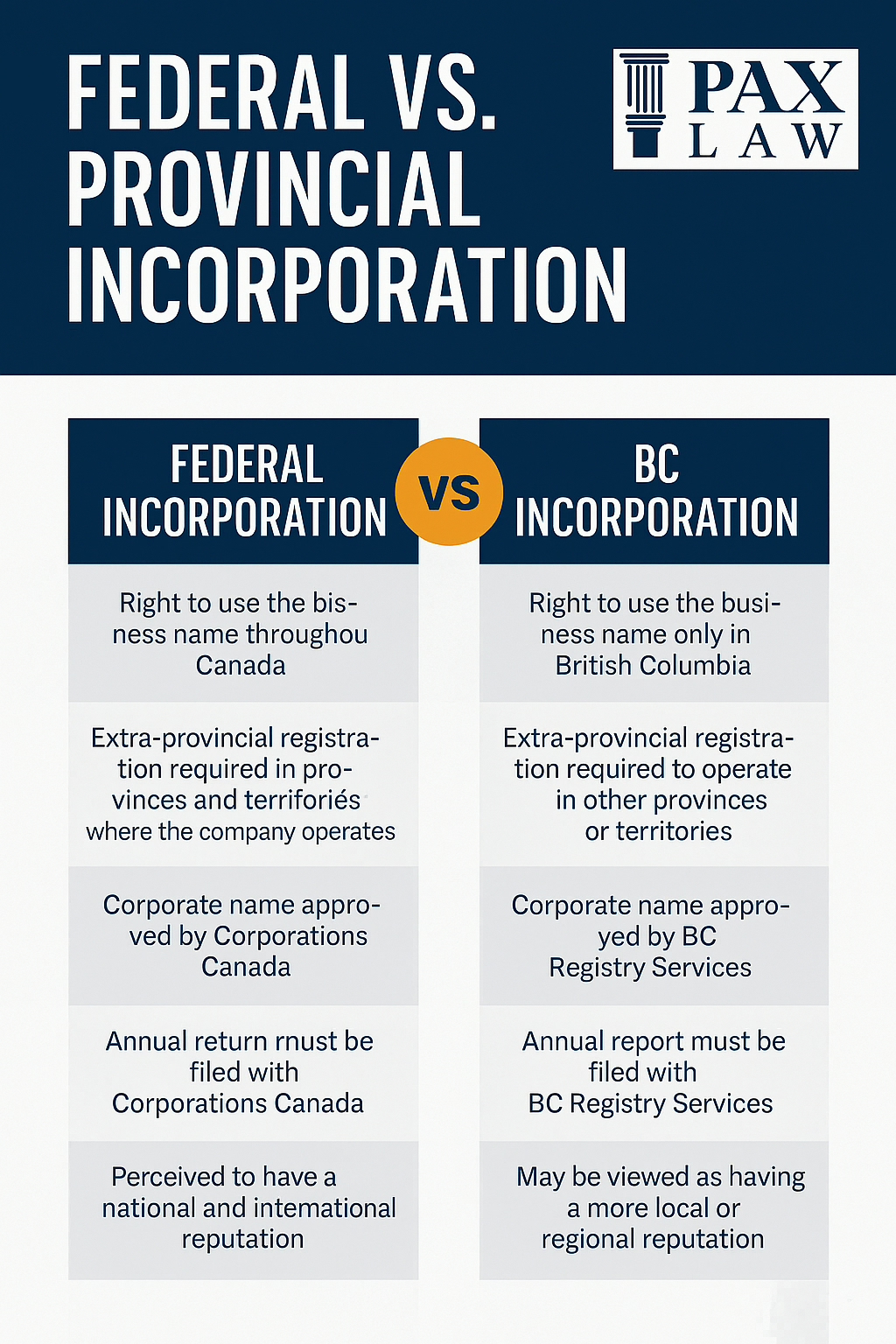Table of contents
The British Columbia (BC) Business Corporations Act (BCA) serves as the foundational legislation for corporations within the province, influencing how businesses operate, from governance and financial transparency to shareholder rights and director responsibilities. Recent amendments to the BCA have brought significant changes that all local businesses, whether small, medium, or large, need to be aware of. This blog post explores these amendments, offering insights into their implications and providing practical advice for businesses navigating this new legal landscape.
Overview of Recent Amendments
The latest amendments to the BC Business Corporations Act reflect the ongoing evolution of corporate governance and the increasing demand for greater transparency and accountability in business practices. These changes are part of a broader movement toward enhancing the ethical standards and sustainability practices of corporations operating within the province. Key areas of amendment include:
- Transparency and Disclosure Requirements: Enhanced disclosure requirements aim to provide a clearer picture of the activities and ownership of corporations. This is particularly aimed at preventing the misuse of corporations for illicit activities such as money laundering and financial fraud.
- Corporate Governance Enhancements: Strengthened provisions around the responsibilities of directors and officers, ensuring they adhere to stringent standards of conduct and prioritize shareholder interests.
- Sustainability and Social Responsibility: New provisions encourage or sometimes mandate companies to consider environmental and social factors in their decision-making processes, aligning with global trends towards sustainability and corporate responsibility.
Impact on Local Businesses
Each of these areas brings both challenges and opportunities for local businesses in BC. Here’s how these amendments impact various aspects of business operations:
Increased Compliance Costs
The enhanced transparency and disclosure requirements could lead to increased administrative burdens for small to medium enterprises (SMEs). For instance, the obligation to disclose more detailed information about shareholders and beneficial ownership can require additional resources, which might be burdensome for smaller businesses. Companies need to evaluate the costs of compliance and consider implementing efficient systems or software to manage these requirements effectively.
Corporate Governance
For local businesses, the tightened corporate governance rules mean that directors and officers need to be more diligent in their roles. This involves ensuring that their decisions align with the best interests of the company while considering the impact on employees, communities, and the environment. Training and ongoing education on corporate governance best practices will become increasingly important.
Sustainability and Social Responsibility
The emphasis on sustainability and social responsibility can serve as a significant advantage for businesses that proactively adapt to these changes. By integrating these practices into their operations, companies can not only comply with new legal standards but also enhance their reputation, attract conscious consumers, and open up new markets. Moreover, these practices can lead to operational efficiencies and potential cost savings, for example, through reduced waste and energy consumption.
Practical Advice for Businesses
Navigating these amendments requires a proactive approach. Here are several strategies that businesses can adopt:
- Stay Informed: Regularly update yourself on legislative changes and understand their implications for your business. Consulting with legal experts can provide clarity and strategic insight.
- Invest in Compliance: Consider the benefits of investing in compliance, such as software solutions that help manage shareholder information and reporting requirements. This can streamline operations and safeguard against non-compliance risks.
- Embrace Sustainability: Look at sustainability not just as a legal requirement but as an opportunity to innovate and differentiate your business in the market. Initiatives like adopting green technologies or sustainable supply chain practices can drive long-term benefits.
- Educate Your Team: Ensure that your directors, managers, and employees understand the changes in the law and how they affect your operations. Regular training sessions can be invaluable.

The recent amendments to the BC Business Corporations Act are reshaping the corporate landscape in British Columbia. While they present new challenges, particularly in terms of compliance and governance, they also offer opportunities for businesses to lead in sustainability and ethical practices. By understanding these changes and strategically planning for them, local businesses can not only adapt but also thrive in this evolving regulatory environment. As always, staying informed and proactive are key to successfully navigating these changes.
FAQ
A1: The recent amendments focus on increasing transparency and accountability, enhancing corporate governance, and encouraging sustainability and social responsibility. Key changes include:
Mandatory disclosure of beneficial ownership.
Enhanced duties for directors and officers to consider environmental and social impacts.
Requirements for more detailed financial and operational reporting.
A2: You will need to maintain and disclose detailed information about the beneficial owners of your company. This includes anyone who directly or indirectly controls more than 25% of the corporation or its voting rights. This requirement aims to increase transparency and deter financial crimes but may increase your administrative workload.
A3: The amendments expand the duties of directors and officers, emphasizing that they must act in the best interests of the corporation while considering the impacts of their decisions on stakeholders such as employees, customers, and the community. This change aims to promote more ethical and sustainable decision-making at the executive level.
A4: Start by integrating sustainable practices into your business operations and decision-making processes. This could involve adopting eco-friendly materials, reducing waste, and engaging more with community projects. Compliance not only involves adhering to new legal standards but also actively seeking ways to make your business operations more socially and environmentally responsible.
A5: Yes, non-compliance can result in penalties including fines and, in severe cases, restrictions on your ability to operate your business. It’s crucial to understand and comply with all requirements to avoid these penalties.
Pax Law can help you!
For businesses operating in British Columbia, understanding and efficiently managing provincial tax obligations is crucial. By staying informed about tax responsibilities, leveraging available credits and incentives, and implementing effective tax planning strategies, businesses can not only ensure compliance but also enhance their operational efficiency. Always consider professional advice tailored to your specific business circumstances to navigate the complex landscape of provincial taxes effectively.
Contact Heena Han at Pax Law Corporation, where expertise meets dedication to resolving your real estate legal needs. With a deep understanding of Canadian business law and a commitment to personalized legal representation, Heena Han offers strategic guidance and advocacy for managing business transactions and disputes. Whether it’s negotiating contracts, handling business litigation, or advising on regulatory compliance, Pax Law Corporation is your partner in navigating the complex landscape of business law. Secure your business interests and advance your goals by reaching out to Heena Han today.
Please visit our appointment booking page to make an appointment with one of our lawyers or consultants; alternatively, you can call our offices at +1-604-767-9529.


0 Comments